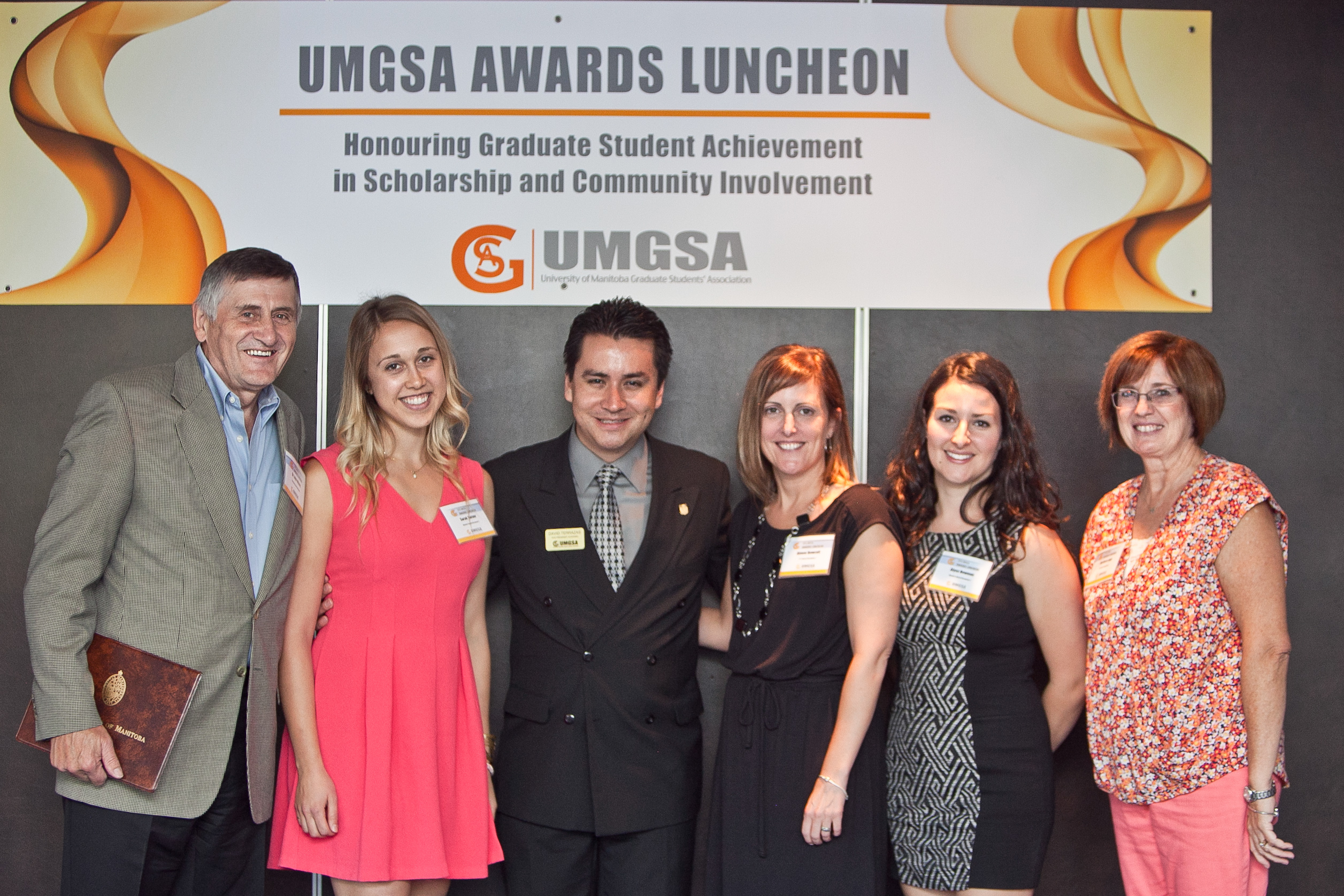The University of Manitoba Graduate Students’ Association (UMGSA) held its annual awards luncheon on Aug. 25, honouring five distinguished graduate students who have been overlooked by other grants and awards.
The UMGSA Awards are meant to support the work of students who have not received the U of M Graduate Fellowship or other national awards. There are two awards for full-time master’s students (valued at $12,000), one award for a fulltime doctoral student ($16,000), and two awards for part-time master’s or doctoral students ($5,000). All recipients are expected to be involved in the community in addition to their scholarly activities.
A teaching award, valued at $500, is offered by graduate students to a professor who has made a signifiant contribution to their teaching profession.
This year’s recipients were Sarah Turner and Alyse Newman (full-time master’s), Barbara Lepp and Aimee Bowcott (parttime), Chelsea Jalloh (Ph.D.), and John Wiens (teaching award).
Turner, a graduate student in the department of community health sciences, studies the effects of breastfeeding on hyperactivity in children. She also works as a research assistant with Jitender Sareen and Tracie Afifi both of whom recently recieved Foundation grants by the Canadian Institutes of Health Research.
Newman, a master’s student in the school psychology program, studies reading difficulties in children. Her research focuses on the strategies children use to cope with reading diffiulties, and the way these strategies differ in younger versus older children.
“My research and practicum have been a great balance as I love working with children and feel it is important to maintain the most scientifially supported assessments and treatments when working with children in schools,” said Newman.
“I specialize in leadership and in literacy, so [schools] will often have an idea for a project, and I can help them out with that because I have the time to do the research and to do the preparation,” Lepp said.
Lepp, a part-time master’s student in the faculty of education, completed her first year of graduate studies in the early 1980s and only recently returned to finish her degree. She runs her own educational consulting company.
Bowcott, a part-time student in the department of community health sciences, is studying for a master’s of public health. This degree is a practicum-based program, rather than thesis-based.
“I look at the practicum more as the ability to learn how to take the research and translate it so it can be applied,” Bowcott said. “I want to be able to apply things and kind of get in there right away, so I’m more of a hands-on person.”
Bowcott came to graduate studies through her volunteer work with HOPE worldwide, a Christian charity organization that operates a wide variety of education, medical, and disaster response initiatives around the world.
Jalloh, a doctoral student in the faculty of education’s ad hoc program, studies literacy as a social determinant of health, especially in homeless and street-involved people. According to Jalloh, we know little about the literacy habits of this group.
“When I was talking to some of the people who hang around Siloam Mission, I saw a man reading a John Irving novel,” said Jalloh during her award presentation. “I thought to myself, ‘I’ve got a couple degrees, and I’ve never read a John Irving novel.’”
Studying the literacy of this community can help to “improve service delivery, improve working with this population in a way that is an effective way of communicating and exchanging information and signals,” Jalloh said in an interview.
Jalloh’s ad hoc program draws from education, sociology, and community health sciences. Her aim is to work in academia while continuing her community involvement, which is through the community resource and drop-in centre Sunshine House.
The teaching award went to Wiens, a professor and former dean of the faculty of education. Wiens congratulated the award recipients in his address, acknowledging their contributions to research and their potential as educators.
“Education is about human flourishing […] about the flourishing of all peoples,” Wiens said. “We want to become better people. But we want to make it possible and help others to become better people.”
This article was originally published in the Gradzette.


